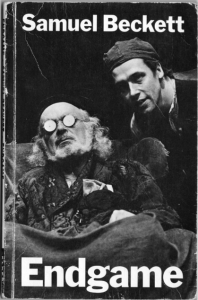Make Lit Class Great Again: Endgame Review
Felicia Gullotta // Blog Writer
Students of literature classes often fall victim to death-by-repetition; the excruciating boredom and frustration that comes along with reading the same books, poems, and plays over and over again. Maybe that’s one of the reasons why some students seem to have a deep hatred for literature classes; they are bludgeoned with the same things until there isn’t a hope that any of them will enjoy the class. So, when something does stand out from the pack, it’s remarkable.
As a glorified English major, literature classes are the bulk of my curriculum. Last year in my British Literature course I wrongly assumed I would be confronted by work I felt overly exposed to. That’s when Endgame by Samuel Beckett was assigned.
Yes, Endgame is technically a play. But whether you’re watching a stage production or reading it for class, one cannot escape the power behind Beckett’s words. They linger in your mind and your soul, taking over and narrating for you a new existence. Let’s start with the characters, of which there are four total. Hamm, the main protagonist, is a blind old man bound to his wheelchair. He complains about life and how his suffering is worse than anybody else’s suffering. Catering to Hamm’s demands is his servant and surrogate “companion” Clov. Rounding out the crew is Hamm’s father and mother, Nagg and Nell. Both characters, lacking legs, live in their own respective trashcan (literal trashcans, full of sawdust).
The play takes place over the course of a single day, though Beckett gives the impression that the characters are stuck in a cycle and the events the audience encountered will happen once again the next day. Hamm sits center stage, with Clov moving his wheelchair about the room a few times. The story of Endgame revolves around the activities—or lack of activities—of the characters. Though one could say that “nothing really happens,” since there is never a feeling of finality, the absurdity and darkness of the play leaves a deep impression in the mind of the audience. As mentioned earlier, there is underlying propulsion that drives the play forward and continues on after the curtain has closed.
It can be described as absurdist, post-apocalyptic, and maybe even depressing. So then why has Endgame become one of my favorite books? Well, simply put, it was something completely new to me. Growing up in a school system that never gave creativity to teaching, Endgame came as a refreshing lifeline, in a slightly grotesque way. And, to add to the appeal of Endgame, there is a production of the play starring Michael Gambon and David Thewlis. Available on YouTube, avid Harry Potter fans can see their beloved Dumbledore and Lupin in a brilliant and haunting new way.

